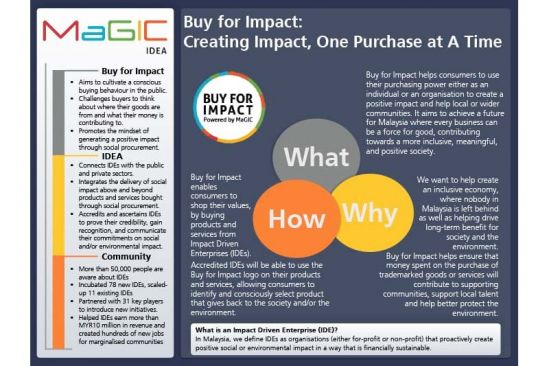Malaysian Global Innovation & Creativity Centre (MaGIC) held the Buy for Impact fair, a two-day public event held at Publika shopping mall, the past weekend. Buy for Impact is a flagship initiative under MaGIC’s Impact Driven Enterprise Accreditation (IDEA) programme, with a goal to sustain the momentum in helping the Impact Driven Enterprise (IDE) sector become more mainstream.
Buy for Impact aims to cultivate a conscious buying behaviour among the general public, as well as private and public sectors with the soon-to-be-released trademarked logo for goods or services by accredited Impact Driven Enterprises (IDEs). This will help inform consumers and encourage them to use their purchasing power either as an individual or an organisation to create a positive impact and help local or wider communities.
Buy for Impact promotes the mindset of generating a positive impact through social procurement and in the near future, accredited IDEs will be able to use the Buy for Impact logo on their products and services, allowing consumers to identify and consciously select products that give back to the society and/or the environment.
Ashran Dato’ Ghazi, Chief Executive Officer of MaGIC, said: “Buy for Impact aims to achieve a future for Malaysia where every business can be a force for good. Through Buy for Impact, we can help assure consumers that money spent on the purchase of trademarked goods or services from IDEs will contribute to supporting communities, support local talent and help better protect the environment.” He added, “At MaGIC, we want to help create an inclusive economy, where nobody in Malaysia is left behind as well as helping drive long-term benefit for society and the environment. We want to challenge individuals and organisations to think about where their purchases come from and to what purpose they are contributing to – by creating impact, one purchase at a time!”
20 IDEs showcased their products at a dedicated fair at Publika shopping mall, inviting members of the public to experience these products and services first-hand. Additional activities hosted on the sidelines of the fair included workshops, demonstrations, and upcycled playground installations.
Among the IDEs that showcased their products and services at the ‘Buy for Impact’ fair was:
1. Biji-Biji – Biji-Biji champions sustainable living and to reuse waste creatively by providing a range of up-cycling and art installation services.
2. Discover Muaythai – Discover Muaythai, or DMT provides employment for underprivileged and at-risk youths via martial arts.
3. The Picha Project – The Picha Project provides job opportunities to families from marginalised groups by creating a platform for them to cater food to the public, utilising their existing cooking skills and equipping them further with professional guidance.
4. Greenyards – Greenyards provides an alternative channel for the local community to dispose their used cooking oil, which are subsequently reprocessed into eco-soap and candles.
5. Walter Barbershop – Walter Barbershop trains and hires from the Bottom 40 (B40) community and provides job opportunities that allow them better access for making choices in life to become economically independent.
6. Silent Teddies – Silent Teddies Bakery is an initiative by the Community Service Centre for the Deaf (CSCD) to equip deaf youths with entrepreneurial skills.
7. The Batik Boutique – The Batik Boutique produces high quality, hand-made Batik products by artisans in Malaysia.
IDEs aim to address pressing societal issues such as access to education, youth at risks, marginalised communities and advocating for environment care such as minimising wastage, promoting upcycling as well as environmental conservation. Some of the common social suppliers for IDEs include food and beverage, merchandising, sustainable events, waste management, education/training, personal care, eco-tourism as well as fashion and textile.
MaGIC recently launched IDEA, a national initiative in collaboration with the Ministry of Finance’s National Entrepreneur Development Office (NEDO) to create a systemic change through the introduction of social procurement and accreditation platforms. IDEA seeks to bridge the disconnect between IDEs and resources as well as opportunities. It seeks to do so in three ways: connecting IDEs with the public and private sectors, giving IDEs access to social procurement opportunities, and helping IDEs establish their credibility through an accreditation program.


